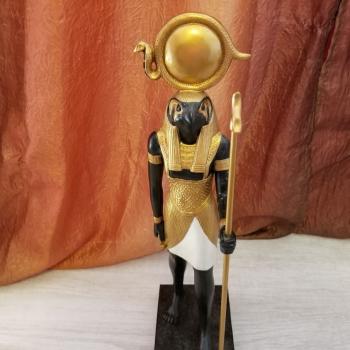
Are we afraid of our gods? Should we be?
In Witchcraft there’s a practice called “drawing down” where a person invokes a deity into another person. This is an adaptation from the section in Aleister Crowley’s Liber XV, the Gnostic Mass where a priest invokes into a priestess. Crowley’s method is based on the Golden Dawn technique called “Assumption of God-Form” where a person invokes a deity into themselves. The Golden Dawn got the idea from their study of Greek and Egyptian theurgy in which Hellenistic magician-philosophers called deities into mediums so they could ask them questions, and sat in meditation with deity by themselves.
So the practice originates with the Neo-Platonists, was revived by the Golden Dawn, showed up in the Gnostic Mass, and transferred to Witchcraft. In the last half-century drawing down moved into the general Pagan community. Today people call deity into themselves and each other very much like the ancient theurgists did.
I use the term “carrying deity” to describe all these related forms of invocation. Recently I wrote an essay including a practice in which a single person can invoke deity into themselves. One of my pre-publication readers asked the question: should a person who is carrying deity on their own for the first time get backup from an experienced person who could help them if something went wrong?
The question startled me. What could go wrong?
I was thinking of this solo practice as a form of deity yoga for Witches and magicians. In the East Asian traditions people meditate with deity as a normal spiritual activity. For the past five years I’ve been sitting with multiple deities every day – Shiva, Durga, the Mahavidyas, the 21 Taras. I’ve seen hundreds of people participate in this practice during Zoom meditation sessions. Why would this practice be alarming in the Western Magical Tradition?
I brought this question to my learned colleagues in the Voice of Olympus Living Theurgy group. Clio Ajana, Jean-Louis de Biasi, Tony Mierzwicki, John Opsopaus, Hercules Invictus and I spent half an hour talking about this. We came to a consensus that first-time theurgists in the western tradition probably should have a support person because the practice is so new to us.
That answered the immediate concern, but the conversation left me with even more questions about the gods, our relationship with them, and how we are rebooting theurgy in the modern world.
Are the gods real?
One topic that came up is whether the gods have an external reality outside of ourselves. The psychologization of magick treats deity as an aspect of the human mind. The western worldview divides the world we can externally observe from our internal experience. What we can measure is objectively real, what is “all in our heads” is myth and fantasy, not real, and if the gods are in our heads, then they’re not real.
When I teach people theurgy I don’t usually encounter a fear that the deities will overwhelm us. Mostly we don’t connect with the deities at all. Many people have expressed to me a longing to have an incontrovertible experience, one which will overcome their deeply ingrained skepticism that the gods are only figments of our imaginations. We need to see and hear and feel something with our physical senses to believe it truly exists, and we have been taught that what we see and hear and feel with our internal senses does not.
For this reason my meditation teacher spends some time assuring her western students that the presence we experience when we draw Goddess into us or bring her out of us is real. Each aspect of Goddess is a particular visualization with a color, a number of arms, implements she carries, an animal vehicle which she rides. She is also a yantra, a glyph which can be drawn like a mandala. She is also a sound, a chant called a mantra which was received by ancient sages and comes from the holy texts called the Vedas. You’ll notice I’m not saying she “has” these things, I’m saying she “is” a visualization, yantra and mantra. These are not symbols of her, they embody her living reality. When we draw her into us or pull her out of us she is a living reality there too.
This is a fundamentally different way of looking at deity. It heals the psychologization of magick and returns us to a world in which the gods exist. My theurgic colleagues also generally agree that the gods have an energic reality outside of the human psyche. John Opsopaus created a glyph for the Hellenic goddess Hygeia, and Hercules Invictus taught us how to say her name in modern Greek which is an invocation.
That brings up another issue. If the gods are real, how can we know if interacting with them will be good for us?
Are the gods good?
In our conversation John Opsopaus reminded us that the Neo-Platonic teachers of theurgy thought of all the gods as being aspects of the One, and taught that the One is fundamentally good. This is in contrast with the stories of the Greek deities where they fight with each other and cause harm to humans. If the deities can harm each other, how can the One be good? John clarified that the One is good in a cosmic sense – the One can be good for existence as a whole while still being bad for you right now.
If the stories show the gods causing harm to humans, will they cause harm to us? I asked my colleagues if we have examples from the magical communities today. Clio Ajana noted that she had heard of people who got into trouble engaging with deity, mostly people who had discounted advice from more experienced practitioners. The Pagan Consent Culture anthology shares other stories. In “Godspousery and Consent” Sebastian Lokason comments he collects accounts of “deity-on-human abuse”. He attributes these incidents to a lack of training for people new to the communities in how to identify spirits, protect yourself from them, and banish them. This is an argument for education as well as support.
John noted that the gods have their own agendas, and these may or may not match up with what we are willing to do. Jean-Louis agreed, and added that polytheism recognizes differences between deities. They’re not necessarily bad or good, they each have their own character; some are benevolent, some are not, and even peaceful deities can be upset when we approach them incorrectly. Our task is to learn when and where to approach them.
We need to be aware of this as practitioners and address this as teachers. When I teach people how to establish a relationship with deity I advise them to set boundaries and clearly communicate them with the deity before agreeing to a relationship. That deep longing for incontrovertible experience can lead us into the kind of unwise commitment that sometimes happens in the heady rush of new love. When a deity says “will you be mine?” the heart wants to answer “yes!” Did you mean that you will do whatever the deity asks you for the rest of your life? I’ve met people who were backed into that corner.
This is another argument for having a meditation auditor – don’t make any agreements before you check with your practice buddy. If what the deity wants sounds like a bad idea to your partner you might want to establish some limits before accepting the divine-human contract.
Are all the gods the same?
Tony Mierzwicki shared that he had been raised in a Christian denomination described as God-fearing. As a Catholic girl I was taught to confess my sins to God and to silently pray for forgiveness. However in India I saw not fear but love. People lined up for hours to view living statues and enter into their sanctuaries; they chanted, sang, wept, and bowed deeply with devotion and profound gratitude.
These are very different expressions of worship. Is it because of the deities themselves? Is the God of the Christians fundamentally different from Hindu Kali? Are God and Kali different from Hermes and Hathor, Odin and Ceridwen, Oya and Sarutahiko-No-O-Kami?
Whatever the gods may be, it is clear that there are different cultural approaches to our relationship with the divine. I believe it is critically important to respect cultural integrity and diversity. When we approach deity we need to pay attention to the culture that originated their worship and to learn to interact with that deity on their own terms.
The Western Magical Tradition grew out of Hellenistic magic. There is some continuity between that past and our present practices, but there are gaps too, and quite a bit of Jewish, Christian and Islamic thought and practice has entered into our tradition. These monotheistic religions frown on the kind of theurgy that interacts with the polytheistic Pagan deities, and the ancient Christians rather famously reframed Pagan gods and goddesses as demons. I wonder if some of our trepidation reflects that cultural overlay.
There’s also a distinction between working with living and dormant traditions. If you’re doing a Hindu or Buddhist practice you can talk to someone who’s done it before. The Greek gods never went anywhere, and European folklore kept European folk religion on life support. However some Pagans revive the religious practices of ancient cultures that are no longer extant. I’ve done my fair share of adapting academic translations of rituals carved into excavated clay tablets. In this case we’ve lost the cultural context surrounding those rituals and there are no living people we can consult. Some guardrails are probably appropriate if we’re going to pull a deity into us who hasn’t been carried in several thousand years.
Now that I think about it, asking this question to the Voice of Olympus Living Theurgy discussion is a good example of the benefits of having a practice group to consult. I bring a lot of questions to my colleagues there. Here’s the recording of the full conversation. It starts at the halfway mark, we started by discussing Jean-Louis’ suggested topic about theurgy and religion. If you subscribe to Hercules Invictus’ YouTube channel you’ll get notified when he posts a new discussion too.
















